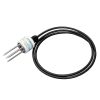Stevens HydraGO Portable Soil Moisture System
The Stevens HydraGO portable soil moisture system makes soil spot sampling quick and easy. Instantly measure soil moisture, electrical conductivity, and temperature.
Features
- Patented sensor instantly measures moisture, EC (salinity) and soil temperature
- Integrated Bluetooth for easy operation with free smartphone app
- Cost effective solution for portable on-the-go soil monitoring
- Free ground shipping
- Expedited repair and warranty service
- Lifetime technical support
- More
Overview
The Stevens HydraGO and HydraGO FLEX represent the most advanced portable soil sensor system. Simply insert the probe into the soil, and tap on the “Sample” button in the HydraGO app. The HydraGO and HydraGO FLEX communicate wirelessly with your smartphone or tablet using Bluetooth. The HydraGO and HydraGO FLEX system features a rugged, Delrin housing that contains a rechargeable battery. The internal battery will last for long field sessions with repeated and frequent data samplings.
Design
The HydraGO has a probe on the end of a shaft for easy surface measurements. It includes 4 segments so that the size can be adjusted from 25 to 84 cm (10 to 33 inches). The HydraGO FLEX has a detachable cabled probe that can be buried and left in the field. The cabled probe allows the user to collect data down a narrow-augured borehole. The HydraGO FLEX comes with a fanny pack and brush for easy on-the-go measurements.
Mechanics
Both HydraGO and HydraGO FLEX utilize the HydraProbe Soil Sensor technology for the soil measurements. The HydraProbe is an impedance-based sensor that fully characterizes the radio frequency energy distribution of a standing wave in the soil measuring both the real and “imaginary” dielectric permittivities. This provides excellent accuracy and precision of the soil measurements across a wide range of soil types.
In The News
Wildfire Prevention in the Sierra Nevada Region with the Yuba Watershed Institute
Though recent wildfires have sparked new conversations about wildfire management and response, groups like the Yuba Watershed Institute have been monitoring the forests and water resources of the Sierra Nevada region for decades, managing approximately 5,000 acres of land with the Bureau of Land Management (BLM) and about 7,000 acres in private land partnerships. The goal of the Institute is to work with local communities and land agencies to improve watershed and forestry management through informed practices and public outreach. The goals of the Yuba Watershed Institute are three-fold: Improve the ability of fire suppression agencies like the California Department of Forestry and Fire Protection ( CAL FIRE ) and the US Forest Service.
Read MoreWave Sensors Integration with NexSens Buoys: A Cutting-Edge Solution for Wave Measurment
Real-time wave data supports accurate weather prediction, safe and efficient maritime operations, and provides valuable safety and operating condition information for recreation and commercial fishing. Understanding wave dynamics also helps with the design of protective coastal structures like seawalls, breakwaters, and jetties. It also supports better prediction of their impact on sediment transport and coastal geomorphology. Wave data is a key factor in qualifying and designing offshore wind farms and harnessing kinetic energy for electrical generation. It helps with the understanding of ocean-atmosphere interactions and contributes to studies of sea-level rise and climate change impacts.
Read MoreSpring 2025 Environmental Monitor Available Now
In the Spring 2025 edition of the Environmental Monitor, we highlight partnerships across the world and the importance of collaboration between government agencies, universities, environmental groups, local communities, and other stakeholders. From great white shark research in Cape Cod to monitoring fisheries in Lake Erie, this latest edition underscores partnerships that connect stakeholders in a watershed through environmental data. With an emphasis on data sharing, a combination of real-time and discrete sampling keeps the public and partners informed of environmental conditions. Our writers also sought out science professionals dedicated to working with peers within and outside of the environmental sector.
Read More








